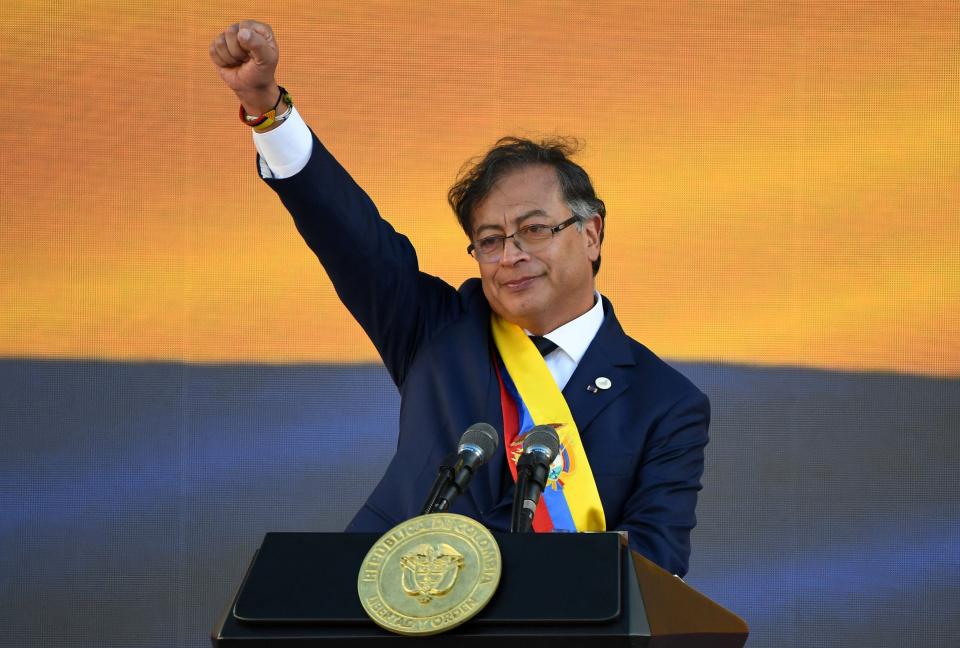As drug crisis rages in US, Biden meets with progressive Colombian president pushing decriminalization
- Oops!Something went wrong.Please try again later.
- Oops!Something went wrong.Please try again later.
WASHINGTON – Colombian President Gustavo Petro declared during his inaugural address last August that the time has come for a new approach in the international war on drugs, which he argued has failed – “and failed resoundingly.”
The leftist leader, who also has vowed to bring “total peace” to his nation of 50 million after six decades of conflict, took his message to Washington on Thursday when he met with President Joe Biden at the White House.
Petro's decriminalization approach comes as Biden has been increasingly criticized by Republicans for being weak on border security and stopping the flow of fentanyl from Mexican cartels who also traffic in Colombian cocaine.
Petro and Biden were to discuss ways to deepen the relationship between their countries and make progress on mutual areas of interest, such as countering narcotics trafficking, promoting economic and security cooperation, combatting climate change and advocating for human and labor rights, White House press secretary Karine Jean-Pierre said.
Drug raid: Italy seizes 4 tons of cocaine worth $256 million in bust linked to Colombian drug operation

Republicans slam Biden drug policy
Biden has been under attack from congressional Republicans who argue that his administration has been weak on drug enforcement.
House Speaker Kevin McCarthy, R-Calif., staged a news conference at the U.S.-Mexico border in February and charged that Biden's border policies have allowed deadly drugs like fentanyl to enter the country illegally.
Fentanyl is trafficked into the United States from countries such as China, India and Mexico and is sometimes mixed with cocaine – often without the user’s knowledge – to increase the drug’s potency or profitability, according to the Drug Enforcement Administration.
Overdoses from synthetic opioids like fentanyl have soared in the United States, and fentanyl accounts for the majority of synthetic opioid deaths, according to the Centers for Disease Control and Prevention.
Has the war on drugs failed?
Colombia is the world’s largest producer of cocaine despite decades of international efforts to curb the drug trade.
In 2021, the Latin American country produced 972 tons of cocaine that are exported mostly to the United States, the White House Office of National Drug Control Policy reported last July.
For almost two decades, the United States spent around $10 billion to fight cocaine production. The initiative known as "Plan Colombia" focused on the eradication of coca, strengthening Colombia's security apparatus and solving an internal conflict where more than 200,000 people died.
Petro argues that the approach has been ineffective in reducing harvests and has instead criminalized otherwise law-abiding peasants and strengthened Mafias.
A landmark truth commission report found the war on drugs prolonged the country's decadeslong civil war.
Instead of a war on drugs, Petro favors expanding crop substitution programs that would provide rural farmers with incentives and training to grow legal crops.
“Reducing drug use does not require wars,” Petro told world leaders at the United Nations in September. “It needs us all to build a better society, a more supportive, more affectionate society.”
Petro told reporters after the meeting with Biden that he asked the U.S. for help in fighting drugs.
"It is one thing to spray a plant and some human beings who are economically weak, and another thing is to pursue the drug trafficking business community, which is done through intelligence work, tracing their assets and their money, and which is done through intersection," he said.
He added: "I requested a little more help in that regard. We need more vessels, more boats, more drones."
Michael Collins covers the White House. Follow him on Twitter @mcollinsNEWS.
Contributing: The Associated Press
Move over, Cocaine Bear: Pablo Escobar's "cocaine hippos" won't stop multiplying - so Colombia wants some gone
This article originally appeared on USA TODAY: President Biden meets with Colombian President Petro to talk drugs

